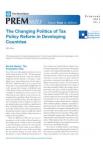PREM Notes 2
This is the second issue of the Special Series on GPSM, “The Changing Politics of Tax Policy Reform in Developing Countries” by Mick Moore is now available online.
Recent History: The Pessimistic View One of the most thorough tax reforms in recent history began in Peru in 1991. The government simultaneously fired most of the tax collectors employed by the Ministry of Finance, established a new semi-autonomous revenue agency (SUNAT) staffed mostly by new recruits from the private sector, and radically simplified the tax code. Among other changes, it abolished most of the dozens of taxes on the books to leave only a handful of significant revenue sources. This reform has become almost iconic in the eyes international tax specialists. Most Peruvians were aware of it and affected by it. But they played no role in bringing it about. Neither tax policy nor tax administration issues had been significant in Peru’s turbulent politics. They remain minor issues today. In that respect, Peru is typical of most developing countries, and very unlike the United States, where furious debates about taxes are a staple of electoral politics.

